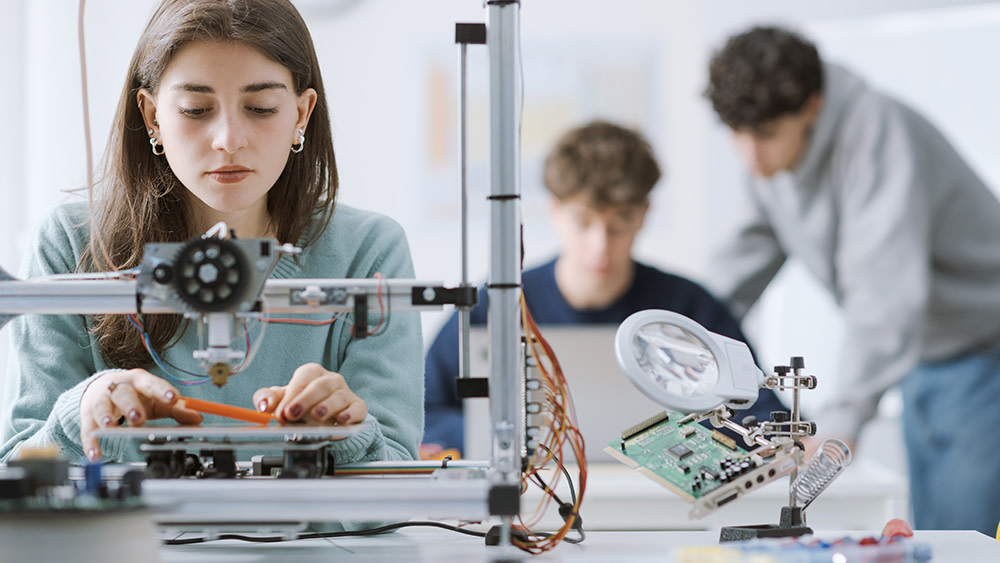Thinking about a career in health care or scientific research? A lab technician course could be your pathway to working in cutting-edge laboratories, helping doctors diagnose diseases, or supporting scientists in groundbreaking research. Laboratory technicians are important contributors in the medical field, combining scientific knowledge with technical skills to produce accurate results that save lives and advance science.
For international students, studying a laboratory technician course in the US is a chance to learn in cutting-edge labs, gain hands-on training, and open doors to global career opportunities. Read on to explore everything you need to know about lab technician courses at US universities, including course structure, subjects, requirements, and future career options.
What Is a Lab Technician?
A lab technician is a skilled professional who plays a key role in modern health care and scientific research. They work with doctors, nurses, and researchers to ensure accurate test results and reliable data, which are essential for patient care and scientific progress.
On a daily basis, lab technicians may prepare and examine samples, conduct laboratory tests, maintain specialized equipment, and record findings. By performing these tasks with precision, lab technicians help ensure that patients receive the right care and researchers have the accurate data they need.
For many students, the appeal of becoming a lab technician lies in the combination of practical, hands-on work and the chance to make a meaningful impact. This career path offers opportunities to contribute directly to patient health, support scientific discoveries, and work in diverse settings such as hospitals, clinics, universities, and pharmaceutical companies.
For international students, pursuing a lab technician course offers the opportunity to gain in-demand skills that are valued worldwide. Whether in hospitals, research institutes, or pharmaceutical companies, lab technicians are trusted professionals who make a real difference.
Now that we have looked at what these professionals do, let us look at how a lab technician course works and what you can expect from your studies.
How Does a Lab Technician Course Work?
A lab technician course provides students with the scientific knowledge and practical training required to succeed in laboratory environments. These courses typically combine:
Theoretical learning covering biology, chemistry, anatomy, and other sciences.
Technical training on how to use lab equipment, analyze data, and follow safety procedures.
Practical experience including internships or clinical placements in hospitals, diagnostic centers, or research facilities.
Programs are structured to balance classroom lectures with lab sessions, ensuring students are job-ready upon graduation. By the time you finish, you will have built both a strong academic foundation and the applied skills needed to start your career or continue to advanced study.
When planning to enroll in a lab technician course, it helps to know what the program structures and requirements are like. Here are several key details.
Lab Technician Course Details
Lab technician course duration: Associate’s degrees take about two years and bachelor’s degrees may take three to four years. Shorter certificate programs also exist, and are often focused on specific lab skills.
Degree types: Depending on your career goals and prior credentials, you may choose between a certificate, an associate’s degree program or a bachelor’s degree program.
Lab technician course fees: Costs vary widely by institution and program level. In the US, tuition for international students can range from $15,000 to $40,000 annually. Some programs also include additional lab or equipment fees.
Certification: After completing your degree, certification from organizations like the American Society for Clinical Pathology (ASCP) can strengthen your resume and expand career opportunities.
Once you know the logistics of course structure, the next big question is: which subjects will you study?
Lab Technician Course Subjects
A laboratory technician course is designed to provide a balance of scientific theory, technical training, and practical experience. The curriculum is typically divided into several key areas, each building on the other to create a well-rounded education for future lab professionals.
Science Foundations
Every program begins with the basics. Courses in biology, anatomy and physiology, chemistry, and microbiology introduce students to the building blocks of life and the processes that affect the human body. These subjects are critical for understanding how diseases develop and how laboratory tests can be used to detect and monitor them. With this foundation, students can approach more advanced techniques with confidence.
Core Laboratory Techniques
After establishing a scientific base, students move on to the technical skills that define the work of a lab technician. Subjects such as hematology, clinical chemistry, immunology, molecular diagnostics, and blood banking train students to conduct the tests that hospitals and research labs depend on every day. Practical skills like phlebotomy, which involves drawing and handling blood samples, are also introduced in a structured, hands-on environment.
Lab Safety and Management
Laboratory work involves handling sensitive materials, advanced instruments, and potentially hazardous substances, which makes safety a top priority in every program. In this part of the course, students study biosafety protocols, quality assurance systems, and equipment maintenance procedures. Applied statistics are also introduced to ensure that results are accurate and reliable. By mastering these areas, future lab technicians learn how to create safe working environments while maintaining the highest standards of precision and consistency.
Communication and Ethics
Being a lab technician requires both strong technical ability and a high level of professionalism. Courses in medical terminology, reporting, compliance, and ethics help students build the communication and decision-making skills needed to succeed in health care and research environments. By understanding patient confidentiality and professional conduct, graduates are prepared to contribute as trusted and reliable members of any medical team.
Practical Training
Finally, most lab technician courses include hands-on training to bridge the gap between classroom learning and real-world practice. This can take the form of clinical placements in hospitals, internships in diagnostic centers, or simulation labs where students practice procedures in controlled conditions. Many programs also conclude with a capstone project that allows students to demonstrate their full range of skills. These experiences are valuable in preparing graduates for the responsibilities of laboratory work.
With the subject breakdown in mind, let us move on to what students need to qualify for admission to a lab technician course at a US university.
Lab Technician Degree Requirements
To succeed in a lab technician course, students need to meet certain academic and language requirements before enrolling. These requirements ensure that every student is prepared for the scientific and technical demands of the program.
Most universities expect applicants to have completed high school (or its equivalent) with a strong background in science subjects. Biology and chemistry are especially important, since much of the coursework builds on these areas. A solid foundation in mathematics is also valuable, as lab work often involves measurements, calculations, and data analysis.
For international students, proof of English language proficiency is usually required. Accepted tests may include the TOEFL, IELTS, or the Duolingo English Test, depending on the institution. Some programs also ask for standardized test scores such as the SAT or ACT, though this varies by university.
In addition to academic transcripts and test results, students may be asked to submit recommendation letters, a personal statement, or evidence of relevant extracurricular activities. These materials give admissions teams a better sense of the applicant’s interest in science and readiness for university study.
Certain universities also require prerequisite courses, such as introductory biology or chemistry, before starting more advanced lab subjects. These prerequisites help ensure students are equipped with the foundational knowledge needed to keep pace with the intensive laboratory curriculum.
Meeting these requirements is the first step toward gaining admission to a program that combines science, technology, and real-world training — setting you on the path to a rewarding career in health care and research.
Lab Technician Career Options
As the demand for health care and biotechnology continues to grow worldwide, the need for qualified laboratory technicians has also increased. This makes pursuing a laboratory technician course an attractive option for international students seeking meaningful careers.
Graduates of lab technician courses enjoy a wide range of career opportunities across healthcare, research, and industry. Here are several roles you could pursue and their average annual salaries in the US, Brazil, China, and India:
Medical laboratory technician
Average salary in the US
$59,658
Average salary in Brazil
R$74.983
Average salary in China
¥132,454
Average salary in India
₹5,23,862
Research assistant
Average salary in the US
$46,662
Average salary in Brazil
R$49.826
Average salary in China
¥77,300
Average salary in India
₹4,88,757
Forensic science technician
Average salary in the US
$80,052
Average salary in Brazil
R$113.084
Average salary in China
¥240,083
Average salary in India
₹12,81,259
Pathology technician
Average salary in the US
$56,427
Average salary in Brazil
R$110.358
Average salary in China
¥148,181
Average salary in India
₹6,17,597
Pharmaceutical lab technician
Average salary in the US
$49,615
Average salary in Brazil
R$27.962
Average salary in China
¥65,756
Average salary in India
Source: SalaryExpert, 2025
With additional study and certification, lab technicians may progress to roles such as clinical lab technologist, laboratory supervisor, or even specialize in fields like genetics, molecular diagnostics, or immunology. Many graduates also pursue advanced degrees in biomedical sciences or medicine.
For international students, studying in the US provides access to world-class universities and career networks that can help you excel in this growing field.
Study at the Best US Universities with Shorelight’s Help!
Choosing to study a lab technician course in the US offers many advantages such as access to advanced lab facilities, opportunities for research, and connections to global health care organizations. Shorelight can help you study at top-ranked universities offering lab technician courses, providing support from when you apply all the way to after you graduate.
Shorelight advisors support you at every step, from finding the right program to preparing your application, securing your visa, and settling into campus life. With Shorelight support, you can focus on succeeding in your studies and confidently pursue your goal of becoming a lab technician.
Find your best-fit lab technician course by speaking to a Shorelight advisor >

